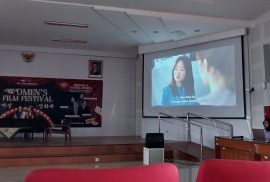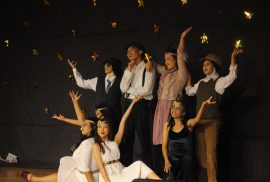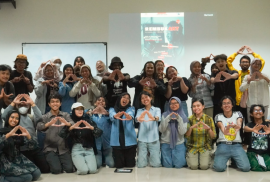Yogyakarta, Sunday, November 10th 2024. The Suar Asa organization of the Faculty of Cultural Sciences, Universitas Gadjah Mada (FIB UGM) held a Psychological First Aid Workshop and Peer Training, as well as the inauguration of new SUAR ASA members. Mental health is an important aspect of human life, as important as physical health. Mental health of students, especially in the UGM campus, is currently a serious problem. According to mental health data from the UGM Academic Hospital (RSA) presented at the Mental Health Competency Improvement for Ambassadors of Health Promoting University (HPU) at RSA UGM, from 2022 to 2023, there was an increase in the number of cases of student hospitalization with mental health problems, namely 21 and 51 cases respectively. In 2022, the gender percentage of mental health cases was most often found in female students compared to male students at 9.4% and females at 90.6%.
The Psychological First Aida and Peer Training was opened by the Head of the Administrative Office, Erika Purnawati, S.Kom., M.Cs. who in this case represented the Chairperson of FIB UGM, in her remarks Erika said that the mental health problems of students at FIB UGM face various challenges, both academic and social that can affect students’ mental well-being. Transition from high school to university, high academic pressure, and personal problems often trigger stress and anxiety among students. Mental health issues at FIB UGM have become a serious concern. Mental health problems experienced by students are usually caused by personal and family problems.
In various mental health situations faced by FIB students, there is the Suar Asa organization which is a forum for students who play a direct role in supporting mental health services for FIB UGM students. Suar Asa is a student organization that focuses on mental health issues and prevention of sexual violence in FIB. In carrying out its function as an organization that deals with mental health issues, Suar Asa has a Teman Cerita program. Teman Cerita is a service opened by Suar Asa for FIB students who want to talk about their lives or to express what they are feeling. This service also collaborates with peer counselors in FIB as facilitators in this service who provide story sessions for FIB students. This service also collaborates with HPU FIB where reports on mental health cases and their follow-up also involve HPU FIB.
The Teman cerita program that has previously been implemented will be developed into a service that focuses on emotional support, namely through the Teman Sehat and Berbudaya (Peer Friends) mental health service. Teman Sebaya offers services as a story friend for students who want to share their problems. Suar Asa is undergoing regeneration of new members, so mental health services at FIB are not yet optimal. Therefore, Peer Friend training is needed to improve their knowledge and skills, in order to optimize the promotion, prevention, and mental health services of FIB UGM through Suar Asa. The participation of various parties is needed to prevent and treat mental health problems.






